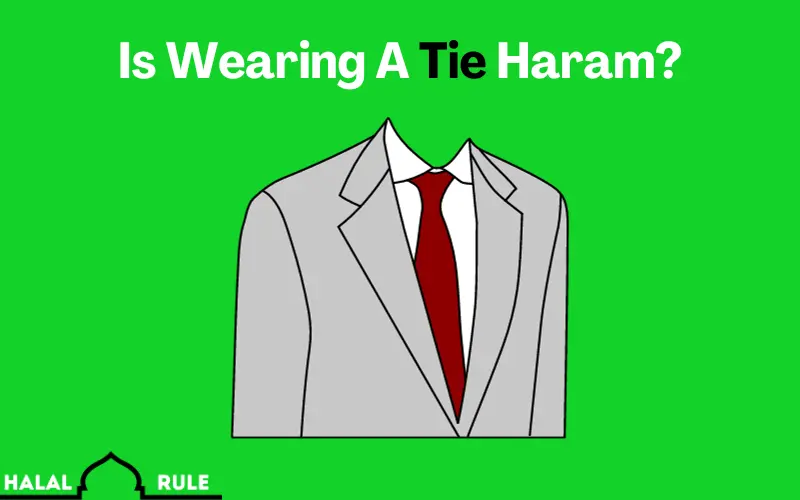Is Wearing A Tie Haram In Islam?
Are you confused about whether wearing a tie is allowed in Islam or not? Well, you’re not alone. There has been a lot of debate and confusion surrounding this topic, with some saying it is forbidden (haram) while others say it is permissible (halal).
In this blog post, we will delve deeper into the issue and answer is wearing a tie haram in Islam.
No doubt, the issue of what is considered permissible or forbidden in Islam can be quite complex and there are varying opinions from different scholars. However, we will try to provide a comprehensive understanding of the topic based on Islamic teachings.
So let’s clear the air and get to the bottom of this question.

Is Wearing A Tie Haram?
No, wearing a tie is not considered haram in Islam. There is no direct mention of ties or neckties in the Quran or Hadith (sayings and actions of Prophet Muhammad).
Some people argue that since ties were not worn during the time of Prophet Muhammad, it must be forbidden.
However, this argument does not hold much weight as there are many things that we use in our daily lives that were not present during the time of Prophet Muhammad, such as cars, planes, and smartphones.
Islam is a dynamic religion that can adapt to changing times and does not restrict innovation.
Islam teaches us not to copy other religious cultures or traditions, but to dress modestly according to our customs and traditions.
As long as a tie does not contain any offensive symbols or messages, it can be worn without going against Islamic principles.
Additionally, no evidence wearing a tie causes harm or leads to sinful behavior. Therefore, it cannot be considered haram in Islam.
We can consider a tie as a Mubah (optional) item in Islam. This means that it is neither forbidden nor encouraged, and one can choose to wear or not wear it based on personal preference.
You might also like to know why is gold haram for men in Islam.
Why Wearing A Tie Halal?
Now that we have established that wearing a tie is not haram, let’s explore why it can be considered halal in Islam.
In many professions and workplaces, wearing a tie is seen as a symbol of professionalism and respect. It is often required to wear a tie in formal settings or for important meetings.
Moreover, ties are also used as part of traditional attire in some Muslim countries, such as Egypt and Turkey. In these cultures, wearing a tie is not seen as going against Islamic teachings.
Furthermore, Islam encourages its followers to dress in a way that reflects their faith and values. As long as the clothing is modest and does not go against any Islamic principles, it can be considered halal.
You can also learn is chrome hearts haram.
Things To Avoid While Wearing A Tie In Islam
While wearing a tie may not be haram in Islam, there are certain things that one should avoid to ensure that it is worn in a way that aligns with Islamic teachings.
- Pride and Arrogance: Wearing a tie should not make one feel superior to others or lead to arrogance. Islam teaches us to be humble and avoid showing off.
- Inappropriate Images or Symbols: As mentioned earlier, wearing a tie with offensive images or symbols is not permissible in Islam.
- Tight Clothing: Ties are often worn with formal shirts that may be fitted. However, it is important to ensure that the clothing is not excessively tight or revealing.
- Neglecting the Sunnah: While wearing a tie may be seen as a modern and professional choice, one should not neglect following the sunnah (traditions) of Prophet Muhammad in terms of dressing modestly and avoiding extravagant attire.
If you keep long nails, must learn is it haram to pray with long nails.
Haram Clothing In Islam For Male
In Islam, there are a few guidelines for what is considered haram clothing for men. These include:
Clothing made of silk: It is forbidden for men to wear any clothing made entirely or partially of silk. This is based on a hadith where the Prophet Muhammad stated that silk and gold are forbidden for men, but allowed for women.
Clothing that imitates women’s clothing: It is also forbidden for men to wear any clothing that resembles what women wear, such as dresses, skirts, and tight-fitting clothes. This is in line with the Islamic principle of modesty for both men and women.
Clothing with images or symbols of other religions: Islam prohibits the wearing of clothing that promotes or shows adherence to any other religion besides Islam. Such as clothing with images of the cross or Hindu gods.
Cloth with living creatures on it: In Islam, it is also not allowed to wear clothing with images of living beings, such as animals or humans. This is based on the belief that only Allah has the power to create living things.
Clothing that exposes the awrah: Men are also required to cover their body from the navel to the knees, known as the ‘awrah’. Therefore, wearing clothing that is too short or revealing in this area would be considered haram.
If you use credit card you can also learn is credit card haram mufti menk.
FAQs
Q. Is wearing a bow tie haram?
A. No, wearing a bow tie is not haram in Islam as long as you don’t wear it to mock or offend anyone.
Q. Is wearing a silk tie haram?
A. Wearing silk is generally considered haram for men in Islam, so it is better to avoid wearing silk ties.
Q. Can I wear tie in Islam?
A. Yes, you can wear a tie in Islam as long as it is worn modestly and does not go against any Islamic principles.
Q. Is it haram to wear silk ties?
A. Yes, wearing silk ties is considered haram in Islam for men.
Conclusion
In conclusion, wearing a tie is not haram in Islam. It is simply an accessory that is neither encouraged nor discouraged in Islamic teachings.
As long as it is worn modestly and does not go against any Islamic principles, it can be considered halal.
We should not get caught up in debates over small matters like this, but instead focus on more important aspects of our faith such as being kind to others and following the core principles of Islam.
I hope your query is wearing a tie haram in Islam has been answered and you have a better understanding of the topic. May Allah (SWT) guide us all to follow His teachings with wisdom and compassion. Ameen.






